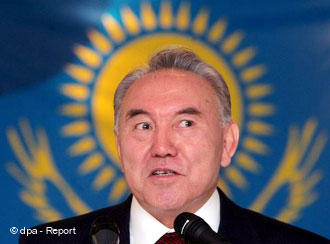 Caught in an emerging market storm, some resource-rich states may keep more windfall income in liquid assets, ready to aid their economies, rather than locked up in strategic investment for future generations.
Caught in an emerging market storm, some resource-rich states may keep more windfall income in liquid assets, ready to aid their economies, rather than locked up in strategic investment for future generations.
Kazakhstan's move last week to dip into its National Fund to slash banks' bad loans and - to some extent - Russia's plan to tap into its wealth fund to bail out Ukraine reduce a potential pool of funds that otherwise could have been invested in capital-heavy projects such as infrastructure.
It also raises concerns that the investment mandates of such funds are still subject to political interference.
Kazakh President Nursultan Nazarbayev ordered officials last week to use $5.4 billion from the National Fund, the country's strategic oil reserve, to help banks.
Russia said it would tap $10 billion from the National Welfare Fund, intended to support the domestic pension system, as part of a $15 billion bailout programme for Ukraine.
Ukraine was not even on the list of countries the fund was allowed to invest in because its debt was rated below the threshold level. But the government quickly added an exemption to the rules, allowing the aid to be shipped to Kiev.
"Some of these concerns are beginning to be raised about flows out of emerging markets. It's inevitable there's a lot of political pressure for funds to be used domestically," said Patrick Schena, co-head of the Network for Sovereign Wealth and Global Capital at Fletcher School, Tufts University.
"If you are under political pressure to invest a portion of assets to stabilise the economy and provide additional funding, then the management of the fund may make a tactical decision to maintain higher allocation to bonds, instead of say real estate."
Usually, a sovereign wealth fund (SWF) receives a portion of windfall revenues from the government in foreign currency. This is part of excess foreign reserves at the central bank.
The intention is to manage it in a way that increases wealth for future generations, sometimes investing in high-yielding overseas securities or illiquid assets such as infrastructure, private equity or property to boost returns.
When a country faces heavy pressure on a currency and a risk of sudden capital flight, the central bank defends the currency either by raising interest rates or intervening with its reserves.
But faced with a crisis, a government may be tempted to combine the coffers of the central bank and the SWF to maximise its firepower. This may make it difficult for the fund to commit a large portion of its assets to illiquid projects.
According to data provider Preqin, 57 percent of the world's SWFs were investing in infrastructure in 2013, slightly up from 2012, with 44 percent invested in social infrastructure such as hospitals and schools.
Many potential investors and governments have counted on sovereign funds to help plug financing gaps in these multi-year deals. Globally, SWFs control assets of more than $5 trillion.
HOW TO SPEND IT
However sound the intentions, such funds carry inevitable temptations for governments.
Ireland raided its 24 billion euro ($33 billion) sovereign wealth fund originally intended to support the social welfare and pension costs in 2009 to recapitalise banks.
In 2010, Dublin dipped into the fund again to contribute to its international bailout.
In Kuwait, the SWF spent at least 1.5 million dinars ($5.3 million) late in 2008 to stop a slide on the local bourse and help banks raise fresh capital in 2009.
Russia also dipped into its NWF to buy local stocks while Kazakhstan gave $9 billion to its Samruk-Kazyna fund to bail out the domestic financial sector in the global credit crisis.
Andrew Ang, an advisor to Norway's SWF and a Columbia Business School professor, says funds with loosely-set mandates run the risk of being used as a political vehicle.
"If you stock money away into one big fund, there's a large temptation for politicians to raid the money for any purposes you like, and that's what happened," Ang said.
"The worst thing, like individuals, is you make ad-hoc decisions and switch investment strategies mid-way. It's not consistent, and often it's done in a sheer panic or over reaction and investment policies turn out to be bad."
Ang says the funds must have specifically defined mandates or investment objectives - be it for rainy days or to promote inter-generational savings. And if necessary, the government can split a fund into multiple vehicles.
"What's the money for? You need narrow purposes for these funds. Dedicated funds promote self-consistent behaviour and put money out of reach for purposes not originally intended."
LONDON, Feb 21 (Reuters)




